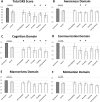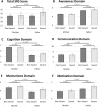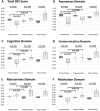Exploring the familial role of social responsiveness differences between savant and non-savant children with autism
- PMID: 32042040
- PMCID: PMC7010762
- DOI: 10.1038/s41598-020-59209-7
Exploring the familial role of social responsiveness differences between savant and non-savant children with autism
Abstract
Savant syndrome is a phenomenon whereby individuals with cognitive impairments have one or more outstanding abilities, inconsistent with their general intellectual functioning. Approximately 50% of savant individuals have autism spectrum disorder (ASD), and 10-30% of people with ASD have savant skills. To shed additional light on this considerable overlap, we compared autistic traits as measured by the Social-Responsiveness-Scale (SRS) between 712 children with at least one reported savant skill, as determined by designated questions from the ADI-R questionnaire (savant group), and 2,032 non-savant children from the Simons-Simplex-Collection (SSC) database. We also examined SRS scores of the parents of these children and compared parent-child differences in SRS scores between the savant and non-savant groups. Savant children had significantly lower SRS scores (less deficiencies) compared to non-savant children (P < 0.05), while no such differences were observed among their parents. Further intra-familial analyses revealed weak pairwise-correlations (r = -0.015-0.141) between SRS scores of parents and their children, and significantly larger parent-child differences in standardized SRS scores within savant families (P < 0.05). These findings suggest that the less severe autistic traits among savant children with ASD compared to other people with ASD is not likely to be a familial trait.
Conflict of interest statement
The authors declare no competing interests.
Figures



Similar articles
-
Cognitive profiles of children with autism spectrum disorder with parent-reported extraordinary talents and personal strengths.Autism. 2022 Jan;26(1):62-74. doi: 10.1177/13623613211020618. Epub 2021 Jun 4. Autism. 2022. PMID: 34088226 Free PMC article.
-
Savant syndrome has a distinct psychological profile in autism.Mol Autism. 2018 Oct 12;9:53. doi: 10.1186/s13229-018-0237-1. eCollection 2018. Mol Autism. 2018. PMID: 30344992 Free PMC article.
-
Psychometric properties of the French Version of the Social Responsiveness Scale in autism spectrum disorder with or without attention deficit hyperactivity disorder.Encephale. 2019 Sep;45(4):285-289. doi: 10.1016/j.encep.2018.08.004. Epub 2018 Nov 22. Encephale. 2019. PMID: 30470500
-
[Neural mechanism underlying autistic savant and acquired savant syndrome].Brain Nerve. 2008 Jul;60(7):861-9. Brain Nerve. 2008. PMID: 18646626 Review. Japanese.
-
Annotation: the savant syndrome.J Child Psychol Psychiatry. 2004 Jul;45(5):899-911. doi: 10.1111/j.1469-7610.2004.t01-1-00284.x. J Child Psychol Psychiatry. 2004. PMID: 15225334 Review.
Cited by
-
Cognitive profiles of children with autism spectrum disorder with parent-reported extraordinary talents and personal strengths.Autism. 2022 Jan;26(1):62-74. doi: 10.1177/13623613211020618. Epub 2021 Jun 4. Autism. 2022. PMID: 34088226 Free PMC article.
-
Autism Spectrum Disorder and Savant Syndrome: A Systematic Literature Review.J Korean Acad Child Adolesc Psychiatry. 2023 Apr 1;34(2):76-92. doi: 10.5765/jkacap.230003. J Korean Acad Child Adolesc Psychiatry. 2023. PMID: 37035789 Free PMC article.
-
How Well Do We Understand Autistic Savant Artists: A Review of Various Hypotheses and Research Findings to Date.J Korean Acad Child Adolesc Psychiatry. 2023 Apr 1;34(2):93-111. doi: 10.5765/jkacap.230004. J Korean Acad Child Adolesc Psychiatry. 2023. PMID: 37035790 Free PMC article.
References
-
- Down, J. L. On some of the mental affections of childhood and youth: Being the Lettsomian lectures delivered before the Medical society of London in 1887, together with other papers. (J. & A. Churchill, 1887).
-
- Kehrer HE. Savant capabilities of autistic persons. Acta Paedopsychiatr. 1992;55:151–155. - PubMed

